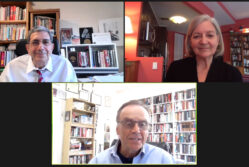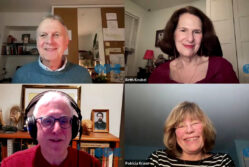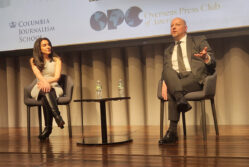
Dozier Spoke of Career Evolution and Learning
“Risk” was a word that appeared in many of the speeches of the 2014 OPC Scholars, the Foundation President William J. Holstein and keynote speaker Kimberly Dozier, now an intelligence writer at The Associated Press, at the Scholarship Luncheon on February 21. This year’s 14 recipients will use their scholarships and internships in Beirut, Nairobi and Cairo, among others, for AP, Reuters, GlobalPost and The Wall Street Journal.
Holstein addressed the issue of risk, speaking to the room at large and parents of the scholars specifically: “They came to us,” he joked. “We didn’t instigate this. But we do urge caution and to take lessons from experienced journalists.”
The 2014 Stan Swinton Fellowship recipient Sam Kimball has reported on the Middle East from Yemen, Syria and Egypt and has been based in Tunis for the past five months completing his master’s thesis on hip hop in the Tunisian revolution. He’s strung together freelance gigs but said that the OPC Fellowship in Beirut with The AP is a welcomed opportunity. “I’m happy to have the structure and stability of a full-time assignment as a reporter,” he said. “I want to dig deeper into the region.”
Every year John R. MacArthur introduces the Harper’s Magazine Scholarship in memory of I.F. Stone and presents the scholar with one of Stone’s books. This year, MacArthur gave Derek Kravitz Underground to Palestine. The book was written in the spring of 1946 when Stone was the first newspaperman to accompany survivors of the Holocaust on their epic clandestine journey from Eastern Europe to the biblical homeland. Kravitz is fluent in French and speaks some Arabic and wants to cover francophone Africa and South East Asia.
This year’s scholars, as in past years, do not fit the profile of millennials that is portrayed in the media: they are focused, savvy about the world and determined to tell other people’s stories. These scholars presented themselves to be the anti-selfies of their generation.
Theo Wilson Scholarship recipient and first OPC Foundation/Wall Street Journal fellow Olivia Crellin is the daughter of two psychiatrists and in her speech likened many of the global events today an illustration that “insanity is the rule.” She said, “This madness is humanity and affects us all.” She spoke about her reporting of victims of sex trafficking throughout Brazil, which is only second to Thailand in child prostitutes. She met a 14-year-old girl on a bus who told her she has had two abortions, her first at the age of eight. “Being a journalist doesn’t feel much differently than being a therapist.”
Acclaimed foreign correspondent Dozier gave the keynote address. “My job is to let you know what you’re in for,” she said. “Thanks to the DOJ, this is the first time I had to have my speech cleared by a lawyer.”
Dozier was making a reference to the May 2013 news that the Justice Department secretly obtained months of phone records of AP reporters and editors. As the intelligence and counterterrorism reporter for the AP, she was one of the journalists who had their phone logs seized.
Her speech was one of caution against getting too comfortable as a journalist. “If you ever think your career is set in stone, be prepared for a shock.”
Dozier’s career is one marked by reinvention and experience. She went from being a domestic newsletter reporter to overseas stringer to overseas CBS news correspondent and now intelligence reporter for the wire service. “There were many false starts, bad jackets and it’s not always easy to look back,” she said. She spoke about the missteps — now clear with hindsight — that might have contributed to being in a car bomb attack in Baghdad in 2006 that killed two CBS colleagues, a translator and an American soldier and left her severely injured. She said she died a few times in the incident and spent three months in a hospital to recuperate.
When she left the hospital she said she felt ready to return to the field but the people around her — from CBS colleagues and bosses to family and friends — were not ready to send her back into a war zone. She received a job offer from the AP and accepted. “I didn’t know a lot about intelligence reporting,” she said. “I gave out my personal phone number of a CIA contact, which was a really bad idea.” Because she used a personal phone number, her records were fair game for the DOJ and her sources left vulnerable. “I became an outcast by friends and contacts who were asked about me by the DOJ.”
She has now implemented alternative forms of communications, many of the same measures her sources use but declined to be more specific, to protect her sources.
“To new journalists, you are up to the task,” she said. “Welcome to the family.”



